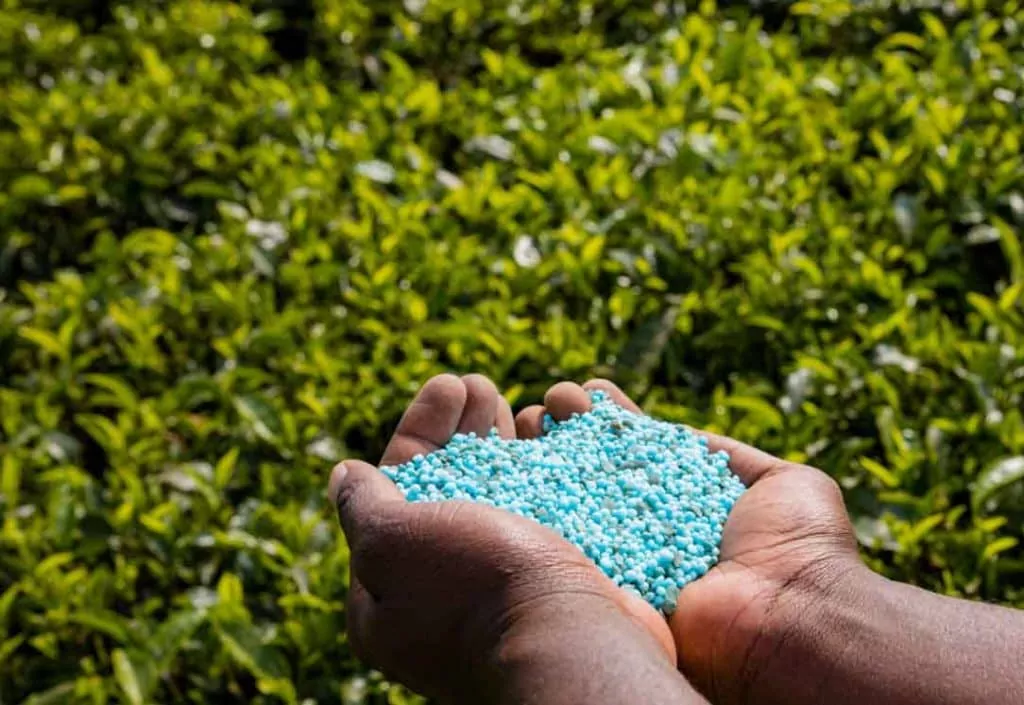
Fertilizers are an essential component of gardening and farming, as they provide plants with the necessary nutrients to grow and thrive.
The 18-18-18 fertilizer has a unique NPK ratio that is suitable for a wide variety of plants.
In this article, we will explore the benefits and uses of 18-18-18 fertilizer, and how it can help promote healthy growth in different types of plants.
Whether you are a beginner or a seasoned gardener, understanding the role of fertilizer in plant growth can help you achieve more fruitful results in your gardening efforts.
Important Read: Top Fertilizers for Growing Huge Cucumbers
What Is 18-18-18 Fertilizer Used For?
18-18-18 fertilizer is a balanced, general-purpose fertilizer used for promoting healthy growth in various plants such as vegetables, fruit trees, shrubs, and ornamental plants.
- The three numbers in the formula represent the percentages of nitrogen (N), phosphorus (P), and potassium (K) in the fertilizer.
- Nitrogen is essential for leaf growth and plant vigor, phosphorus supports root growth, and potassium helps plants resist disease and stress.
- The balanced formula of 18-18-18 fertilizer provides equal amounts of these essential nutrients, making it perfect for use in a wide range of plants.
It can be used for both indoor and outdoor plants and is especially useful for plants that require regular feeding throughout the growing season.
The Nutrients in 18-18-18 Fertilizer
The number 18-18-18 in the fertilizer is indicating the NPK ratio of the fertilizer. The NPK ratio shows the percentage of nitrogen, phosphorus, and potassium in the fertilizer. So, from this fertilizer, your plants will get these three vital nutrients.
Not only those, but the fertilizer can also contain nutrients like iron, zinc, boron, copper, molybdenum, and so on. Additionally, compounds like Ammoniacal nitrogen (NH4), Magnesium oxide (MgO), Nitric nitrogen (NO3), Sulfur trioxide (SO3), and more can be present in an 18-18-18 fertilizer.
The N-P-K Ratio of 18 18 18 Fertilizer
18-18-18 fertilizer contains an equal amount of nitrogen, phosphorus, and potassium. The number 18-18-18 shows the percentage of nitrogen, phosphorus, and potassium respectively. Plants receive significant nutrition from equal amounts of three essential nutrients.
18-18-18 provides your trees, vegetables, and flowers with the essential nutrients for proper and balanced growth, a better root system, and healthy stems and branches.
The nutrients in the fertilizer help the plants to be strong enough to withstand adverse conditions. The nutrients can also contribute to a bountiful harvest if applied properly.
Is 18 18 18 Fertilizer Good for Lawns?
The 18-18-18 fertilizer contains a unique NPK ratio. It contains some essential nutrients that can help your grass thrive and result in a lush green lawn. However, that doesn’t mean we can apply it anywhere. When it comes to grass, you need to ensure the right amount of nutrients.
If the provided nutrients are less than required, your grass will simply not thrive as expected. And if the nutrients are way too much, your lawn can be damaged badly. That’s why before applying any fertilizer to your grass, first test the soil and check which nutrients the soil is lacking.
After soil testing, check the information panel of your selected fertilizer packet. If the manufacturer recommends using it on grass and the NPK ratio fulfills the needs of the soil, you are good to go with it.
18-18-18 Fertilizer Spread Rate
The application rate of fertilizer depends on the formula. It is also dependent on the plant’s nutrient requirements. However, the formula, type of fertilizer, etc. vary from brand to brand.
For example, Shur-Crop 18-18-18 fertilizer comes in granular form and a 50 lb (22.68 kg) bag is enough to cover an 8,000 sq. ft. area. This makes it clear that the spread rate will be different from other types of fertilizer. So, to identify the spread rate of the brand you choose, check the information on the package or trusted sources of that brand.
Frequently Asked Questions
Will 18-18-18 Fertilizer Help Plants Grow Properly?
Fertilizers are made to help your plants one way or the other. This is the primary objective of any fertilizer. That’s why 18-18-18 fertilizer is not an exception. As we have said many times, 18-18-18 fertilizer contains many essential nutrients for your plants, including nitrogen, phosphorus, potassium, and so on.
Every plant needs these more or less. So, when you apply the 18-18-18 fertilizer, the nutrients will start resolving the deficiency issues and work on improving the soil so that the plant can get the needed nutrition and grow properly.
Is 18-18-18 Fertilizer Good for Lemon Trees?
Lemon trees require high nitrogen. So, the fertilizer should be one with a high nitrogen ratio. However, there is a limit to the nitrogen ratio. The NPK ratio of an ideal fertilizer should not exceed 8-8-8. An example of a good lemon fertilizer would be 6-6-6 fertilizer.
Since we are talking about 18-18-18 fertilizer, we should understand that the 18-18-18 NPK ratio is way beyond the 8-8-8 limit. However, some brands suggest their 18-18-18 fertilizer is good for fruit trees like Citrus. You may check those out for additional information.
Final Thoughts
To grow healthy and produce better harvests, your plants need fertilizer. Depending on the nutrient content of the fertilizer, plants can benefit differently from different fertilizers. In this article, we talked about 18-18-18 fertilizer and what are its uses.
If your plants lack specific nutrients, and you find out that 18-18-18 fertilizer is the remedy, follow our information and wait to see the results.
